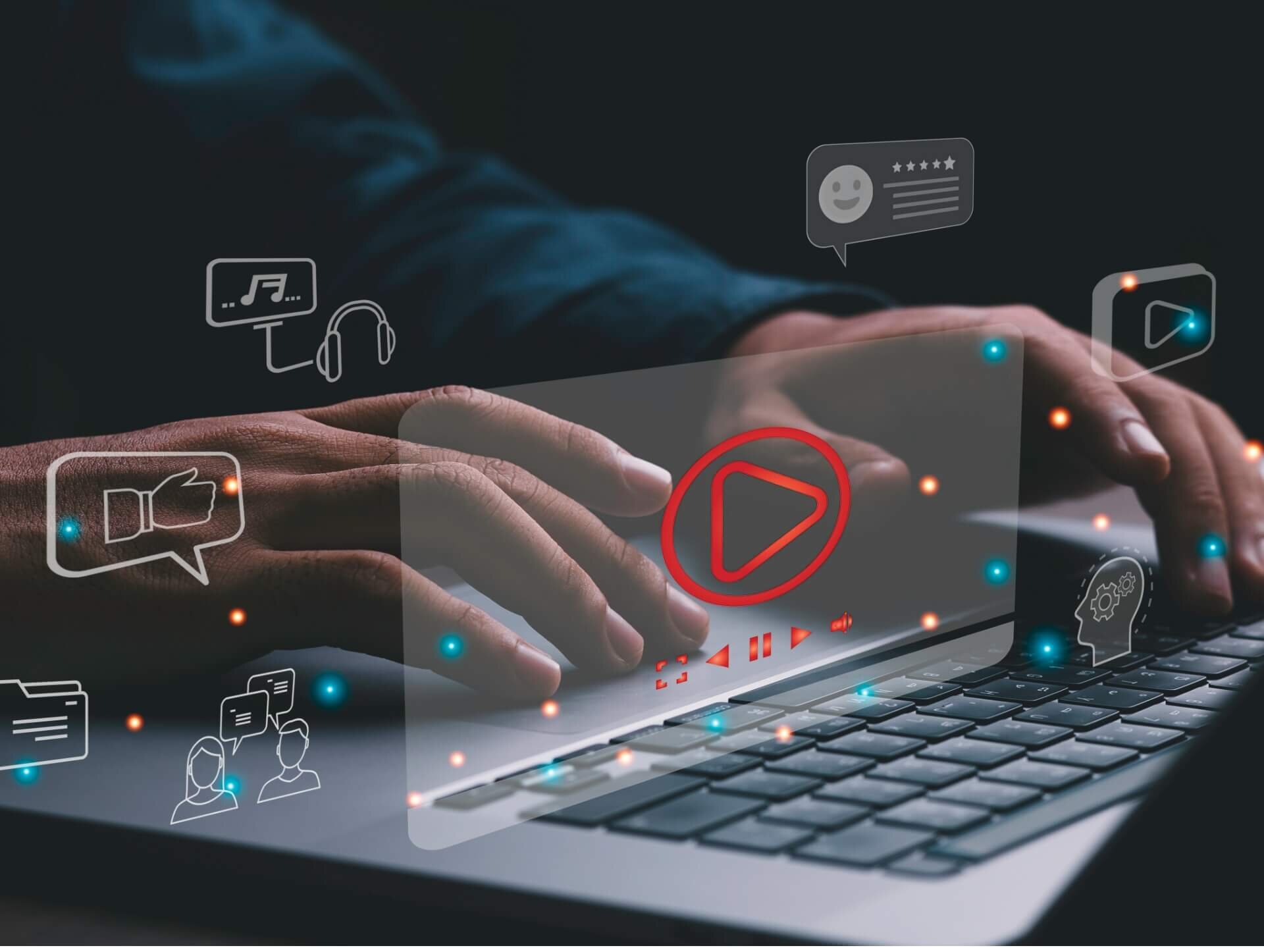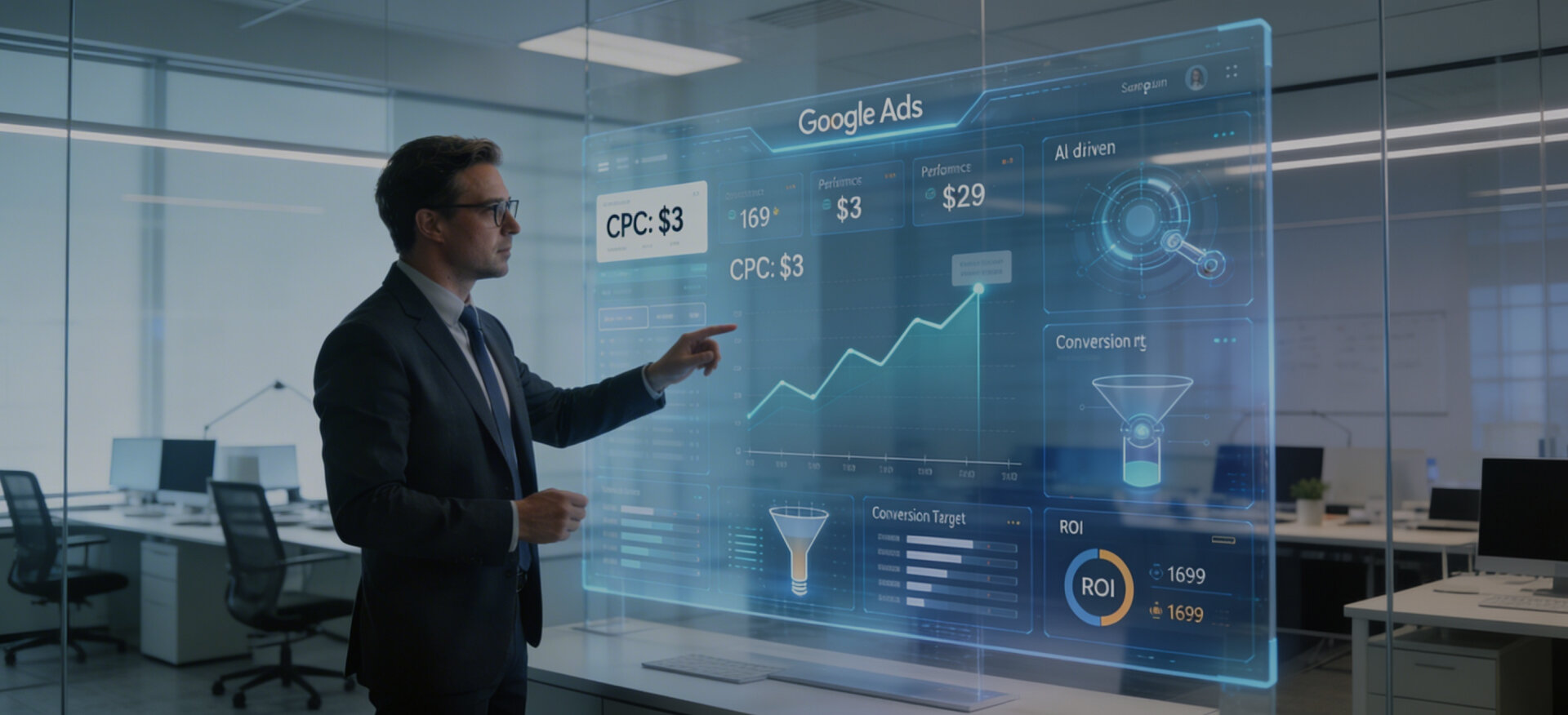Artificial intelligence has stormed into the digital marketing world, with tools like ChatGPT, Google Bard, and Jasper AI transforming how content is created, analyzed, and optimized.
With the rise of AI-powered platforms, marketers now have access to content creation, keyword research, and SEO automation tools once thought to be the exclusive domain of human experts.
In fact, according to Statista, the global AI software market is expected to reach $126 billion by 2025, much of which is being driven by content and marketing automation tools.
At the same time, search engine optimization is projected to reach USD 234.8 billion by 2030, growing at a CAGR of 17.6%.
With more than 90% of online experiences beginning with a search engine, SEO still sits at the core of digital strategy for brands worldwide.
But as AI becomes smarter and more integrated into both content generation and search engine algorithms, a critical question emerges: Can AI replace traditional, human-led SEO?
In this blog, we'll break down how AI is currently being used in SEO workflows, what it excels at, and what it still can’t replicate. Also, we’ll take a closer look at how search behavior is changing and what professionals can do to adapt.
Understanding SEO Today
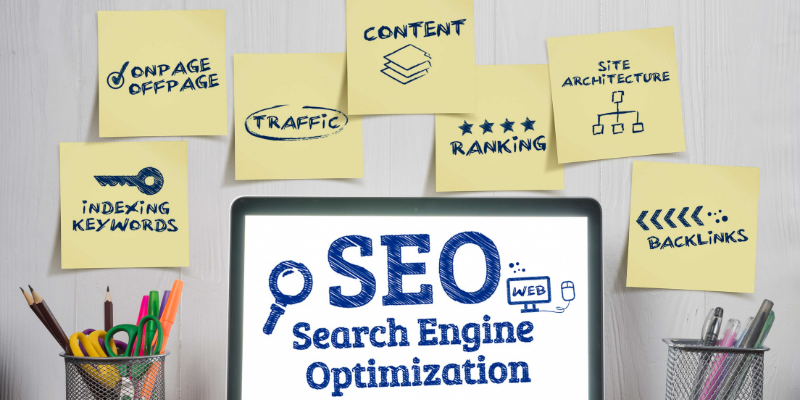
Over the years, SEO has transitioned from keyword stuffing and link schemes to a more sophisticated approach that prioritizes user experience, content quality, and technical optimization. Modern SEO strategies are built upon these key pillars: On-Page SEO, Off-Page SEO, Technical SEO, and Content.
1. On-Page SEO
This involves optimizing individual web pages to rank higher and earn more relevant traffic. Key elements include meta tags, headers, URL structures, and internal linking.
By ensuring that each page is structured effectively and contains relevant keywords, websites can improve their visibility in search engine results.
For businesses offering B2C corporate website services, it is crucial to focus on these elements to enhance user experience and organic rankings.
2. Off-Page SEO
Off-page SEO focuses on external factors that influence a website's authority and trustworthiness.
This includes building high-quality backlinks, social media engagement, and influencer collaborations. These efforts signal to search engines that the website is reputable and valuable to users.
Integrating PIM solutions can further support off-page SEO by ensuring that product information is consistent across various platforms, enhancing the website's authority and trustworthiness.
3. Technical SEO
Technical SEO ensures that a website meets the technical requirements of modern search engines. This consists of site speed, mobile-friendliness, secure connections (HTTPS), and proper indexing.
Thus, a technically sound website facilitates better crawling and indexing by search engines, leading to improved rankings.
4. Programmatic SEO
Programmatic SEO is an advanced strategy that involves using automation and structured data to create a large number of web pages targeting specific keywords.
This programmatic seo approach is particularly effective for websites aiming to rank for a vast array of long-tail keywords. By leveraging templates and databases, businesses can efficiently generate unique, SEO-optimized pages at scale, enhancing their visibility across numerous search queries.
Thus, companies like Zapier and Expedia have successfully implemented programmatic SEO to drive substantial organic traffic.
5. E-Commerce SEO
eCommerce SEO focuses on optimizing online stores to improve their visibility in search engine results, thereby attracting more potential customers.
Unlike traditional SEO, eCommerce SEO focuses on product and category pages, ensuring they are structured and written to meet both user intent and search engine algorithms.
This involves comprehensive keyword research to identify terms that potential customers use, optimizing on-page elements like titles, meta descriptions, and product descriptions, and ensuring a logical site architecture that facilitates easy navigation and indexing by search engines.
Technical aspects, such as improving site speed, ensuring mobile-friendliness, and implementing secure HTTPS protocols, are also crucial components.
Additionally, incorporating user-generated content like reviews can enhance credibility and provide fresh content for search engines to index.
6. Enterprise SEO
Enterprise SEO is a specialized approach to search engine optimization tailored for large-scale organizations with extensive websites, often comprising thousands or even millions of pages.
Unlike traditional SEO, which focuses on smaller websites, enterprise SEO addresses the unique challenges of optimizing vast digital properties to improve visibility, rankings, and organic traffic across search engines.
7. Content Creation
High-quality, relevant content is the cornerstone of effective SEO services.
Creating informative and engaging content that addresses users' needs and queries helps establish authority and drives organic traffic. Regularly updating content ensures that it remains current and valuable to readers.
To craft such content, it's essential to understand your audience deeply.
This involves researching their motivations, pain points, and preferred information channels. By doing so, you can create content that resonates with them, providing solutions and insights they seek.
Moreover, search engines prioritize content that offers a satisfying user experience. This means your content should be well-structured, easy to navigate, and free from errors.
Incorporating relevant keywords naturally, using clear headings, and providing actionable takeaways can enhance readability and SEO performance.
Take a look at our content creation services
The Human Role in Keyword Research, Strategy, and Intent Analysis
While AI tools have become instrumental in processing data and identifying keyword opportunities, human expertise remains crucial in interpreting this data and crafting effective strategies.
Humans excel at understanding the nuances of language, cultural context, and user behavior, which are essential in analyzing search intent.
Given this, by discerning whether a user's query is informational, navigational, or transactional, marketers can tailor content to meet specific needs, thereby enhancing user satisfaction and engagement.
Moreover, human strategists are adept at aligning SEO efforts with broader business goals, ensuring that content not only attracts traffic but also drives conversions and supports brand messaging.
This strategic oversight is vital in maintaining ethical SEO practices and adapting to the ever-changing digital landscape.
The Rise of AI in SEO
The integration of artificial intelligence into SEO workflows is reshaping the way professionals approach digital marketing.
Tools like ChatGPT, Jasper AI, Surfer SEO, and Clearscope have brought automation, speed, and precision into processes that were once labor-intensive.
ChatGPT is widely used for ideation, drafting blog outlines, rewriting meta descriptions, and generating FAQs based on target keywords.
Jasper, a writing assistant built for marketers, takes this further by creating long-form content tailored to specific tones and audiences.
Surfer SEO combines NLP with real-time SERP data to recommend optimal keyword usage, content length, and structure.
Similarly, Clearscope helps users create SEO-friendly content by analyzing top-ranking pages and scoring content relevance based on keyword integration and comprehensiveness.
AI plays a pivotal role in keyword clustering, where large lists of keywords are grouped into semantically related clusters to guide content strategies. For example, AI can be particularly useful in optimizing Local SEO strategies in Houston, helping businesses rank better in local search results by targeting location-based keywords and content tailored to a specific geographic area.
This allows marketers to focus on content themes instead of isolated keywords an approach favored by modern search algorithms.
For example, AI can be particularly useful in optimizing Lawyer SEO strategies, helping law firms rank better in local search results by targeting location-based keywords and content tailored to a specific geographic area.
Additionally, AI enhances content generation by rapidly producing drafts that follow SEO best practices.
On the analytical front, AI tools evaluate SERP trends, user intent, and content gaps, enabling data-backed decisions faster than manual analysis ever could.
The results speak for themselves.
Real-world applications highlight AI's impact on SEO efficiency:
-
HR SaaS Company: By implementing Surfer SEO's content clustering and optimization tools, an HR SaaS company experienced a 17x increase in daily website traffic over seven months.
-
Lyzr AI: Utilizing Surfer SEO for content creation and optimization, Lyzr AI achieved a 150% increase in organic traffic within three months.
What’s more, enterprise-level SEO teams are now integrating AI into content auditing, site health diagnostics, and A/B testing of headlines, further increasing efficiency across departments.
What AI Can Do in SEO?
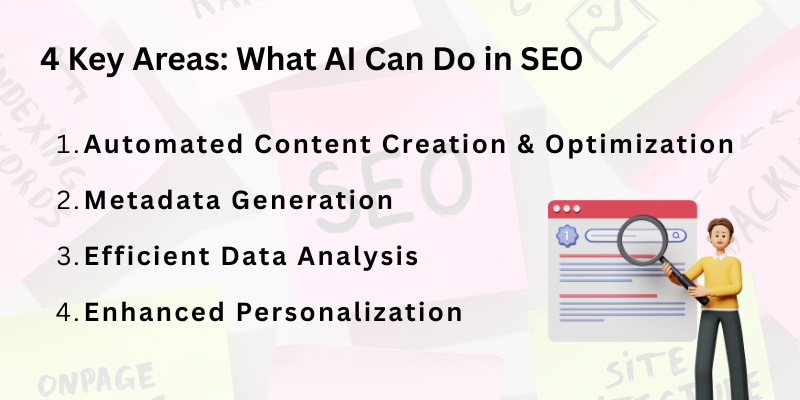
Artificial Intelligence is transforming SEO from a manual, time-consuming process into a streamlined, scalable strategy.
Here’s what AI can do in SEO:
1. Automated Content Creation and Optimization
AI has revolutionized content creation by enabling the generation of SEO-friendly articles, product descriptions, and blog posts.
By analyzing top-performing content and understanding search intent, AI can produce drafts that align with current SEO best practices.
This automation accelerates content production, allowing marketers to focus on strategy and creativity.
2. Metadata Generation
Crafting effective meta titles, descriptions, and image alt tags is crucial for search engine visibility.
AI tools can analyze page content to generate optimized metadata that accurately reflects the page's purpose and includes relevant keywords.
This not only improves click-through rates but also ensures consistency across large websites.
3. Efficient Data Analysis
Analyzing vast amounts of SEO data manually can be time-consuming.
AI excels at processing data such as keyword rankings, backlink profiles, and competitor strategies.
By identifying patterns and trends, AI provides actionable insights that help in making informed decisions quickly, keeping SEO strategies agile and effective.
4. Enhanced Personalization
AI enables the delivery of personalized content experiences by analyzing user behavior, preferences, and search history.
This personalization ensures that users receive content that is most relevant to them, increasing engagement and satisfaction.
Also, search engines favor personalized content, which can lead to improved rankings.
What AI Can’t Do (Yet)?
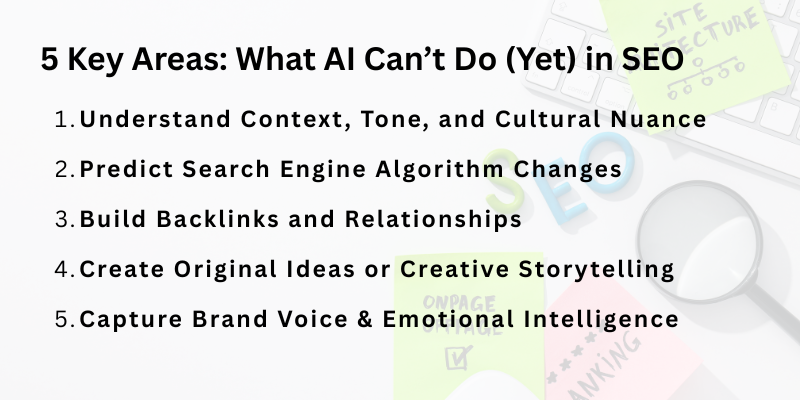
While AI has significantly advanced SEO practices, there are still critical areas where human expertise remains indispensable.
Here's what AI currently cannot do for SEO:
1. Understand Context, Tone, and Cultural Nuance
AI struggles to grasp the subtleties of language, including idiomatic expressions, humor, and cultural references. This limitation can lead to content that feels off or even inappropriate to certain audiences.
2. Predict Search Engine Algorithm Changes
Search engine algorithms, like Google's, are complex and frequently updated. While AI can analyze historical data to identify patterns, it cannot foresee future algorithm changes with certainty.
This unpredictability means that SEO strategies relying solely on AI may not adapt swiftly to new ranking factors introduced by search engines.
3. Strategically Build Backlinks and Relationships
Effective backlink building often involves personalized outreach, relationship building, and understanding the nuances of different websites and their audiences.
AI lacks the human touch required to establish trust and negotiate partnerships, which are essential for acquiring high-quality backlinks.
Moreover, AI may inadvertently target low-quality or irrelevant sites, potentially harming a website's SEO.
4. Create Truly Original Ideas or Perform Creative Storytelling
AI generates content based on existing data and patterns, which limits its ability to produce genuinely original ideas or narratives.
While it can assist in drafting content, the creative spark that leads to innovative concepts and compelling storytelling remains a uniquely human trait.
AI-generated content often lacks the depth and emotional resonance that human-created stories possess.
5. Capture Brand Voice and Emotional Intelligence
Every brand has a unique voice and emotional tone that resonates with its audience.
AI struggles to consistently replicate this voice, especially when subtle shifts in tone are required across different content pieces.
Maintaining brand consistency and forging emotional connections with readers are areas where human writers excel, ensuring that content aligns with brand identity and audience expectations
That said, while AI offers valuable tools for enhancing SEO efficiency, it cannot replace the nuanced understanding, creativity, and emotional intelligence that human professionals bring to the table.
SEO vs AI: A Collaboration or Competition?
Many people wonder if artificial intelligence will one day replace search engine optimization (SEO) experts. But instead of being rivals, SEO and AI can actually work better together than apart.
Think of AI as a helpful assistant that’s really fast at doing tasks that take humans a lot of time. It can quickly analyze huge amounts of data, suggest keywords, organize content ideas, and even help with writing. But while AI can do all these things, it still needs direction from someone who understands the bigger picture, like an SEO expert.
For example, AI might know what people are searching for, but only a human can decide why that matters to a business. Humans can bring creativity, emotional understanding, and strategy—things AI still struggles with.
A person knows the tone of voice a brand should have, how to connect with a specific audience, and when to try something new. These decisions go beyond data—they rely on experience and intuition.
Working together, AI can save time on research and analysis, while SEO professionals can focus on crafting messages, adjusting strategies, and making sure everything fits the brand's goals.
This partnership allows teams to work smarter, not harder.
A good way to think about it is like a painter using modern tools. The tools might help speed things up or make the process easier, but the artist is still the one deciding what to paint and how to bring the vision to life.
As SEO continues to evolve, professionals who learn how to use AI wisely will be in a great position. They’ll spend less time on repetitive tasks and more time on meaningful work that makes a real impact.
So, is it a competition? Not at all. SEO and AI are better together—a smart mix of machine speed and human strategy.
Future of SEO with AI
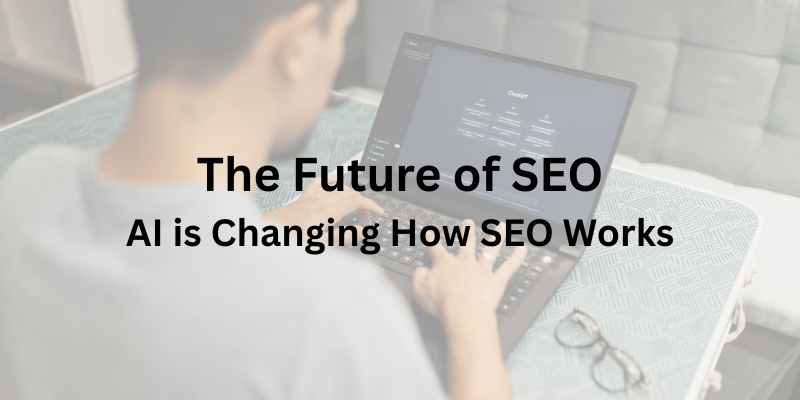
As artificial intelligence continues to shape the digital world, the future of SEO is headed toward exciting changes. AI isn’t replacing SEO—it’s transforming how it works, making it more dynamic, intelligent, and personalized than ever before.
One big shift is the rise of conversational search. People are no longer typing simple keywords into search engines, they are speaking full questions to voice assistants or chatting with AI on websites.
This means SEO will need to focus more on natural, human-like language and context. Websites will have to answer questions the way people actually ask them, using clear and conversational wording.
Another big change is predictive SEO. AI will help marketers understand what users are likely to search for in the future by analyzing past trends and behavior. Instead of reacting to what's already ranking, businesses will be able to plan ahead, creating content based on what’s expected to become important.
This shift can give brands a real advantage by getting ahead of competitors.
As AI becomes more central to SEO, we’ll also see new roles emerge. For example, prompt engineers will know how to ask the right questions or give the right commands to get useful output from AI tools.
AI content validators will review AI-generated content to ensure it’s accurate, meaningful, and fits the brand’s voice. These roles will combine technical understanding with creativity and strategy.
In the coming years, SEO won’t just be about rankings and keywords, it will be about understanding people, predicting needs, and creating helpful, engaging experiences.
Those who embrace AI as part of their workflow will not only stay relevant but also lead the way in this new era of digital search.
The future of SEO with AI is bright. It’s not about man vs. machine, it’s about using both together to build better, smarter, and more human-friendly online experiences.
Conclusion
To conclude, AI has undeniably transformed Search Engine Optimization (SEO), offering tools that enhance efficiency, data analysis, and scalability.
AI excels at processing vast amounts of information, identifying patterns, and automating routine tasks, which can significantly streamline SEO operations.
However, AI lacks the human touch, empathy, creativity, and cultural understanding that are crucial for crafting compelling content and building authentic connections with audiences.
Also, human intuition allows SEO professionals to interpret nuanced user intent, adapt to evolving trends, and develop strategies that resonate on a deeper level.
The future of SEO is not a battle between AI and human expertise but a collaboration where each complements the other.
Given this scenario, AI serves as a powerful assistant, handling data-driven tasks, while humans provide strategic oversight, creative direction, and ethical considerations.
To remain relevant in this AI-driven era, SEO professionals should embrace continuous learning, adapting to new technologies and methodologies.




